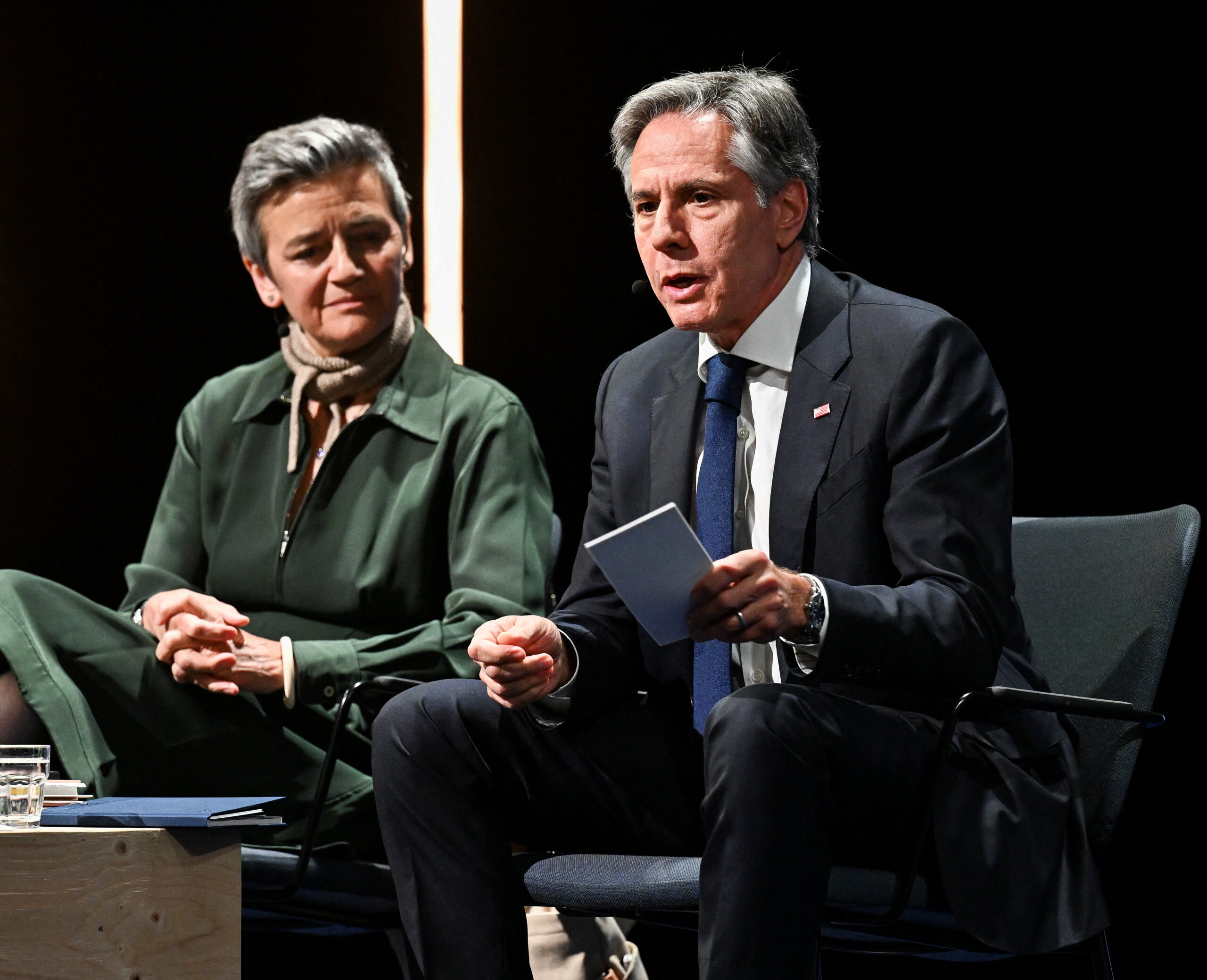March 26, 2024 • 4:54 pm ET
On this yr of elections, the US-EU Commerce and Know-how Council ought to get strategic
On April 4, the management of the US-EU Commerce and Know-how Council (TTC) will meet in Leuven, Belgium, for what is anticipated to be the final session till after elections later this yr within the European Union (EU) and the USA. This assembly can be essential for convincing whoever is in energy subsequent yr that the TTC is an experiment price persevering with. The TTC must display that it has a central function to play in addressing the challenges that the USA and the EU should meet collectively.
In some ways, that is an unreasonable expectation. Established in 2021, the TTC was initially supposed for a way more restricted function—discovering methods to ameliorate commerce conflicts that had been prone to emerge from using new applied sciences. Because the Biden administration sought to reaffirm the transatlantic partnership and provides new prominence to the US-EU relationship, this was a fittingly restricted ambition for an untried mechanism. In a world of rising however less-than-urgent challenges, constructing cooperation on new applied sciences and avoiding new commerce disputes appeared an affordable solution to reinvigorate a bruised transatlantic partnership.
However the transatlantic partnership now faces a lot bigger geopolitical challenges than it did three years in the past, together with Russia’s full-scale invasion of Ukraine, the Israel-Hamas battle, and a extra acute Chinese language risk to European and US competitiveness. In response to this extra sophisticated world, the TTC should tackle a extra strategic function. Its work thus far in addressing technical-level points associated to new applied sciences—resembling synthetic intelligence (AI) and quantum computing—ought to proceed, since these efforts are essential to strengthen US and EU competitiveness. On the identical time, the TTC ought to construct on the work it has pursued since February 2022 on export controls, whereas additionally strengthening its engagement in sanctions coordination and enforcement. In Leuven, the TTC ought to clarify that it’s stepping as much as a revitalized agenda, one which even when targeted on technical points is doing so inside a strategic framework.
That framework ought to be guided by three watchwords:
- Values, primarily based on democracy and the rule of regulation
- Resilience, each in politics and the economic system
- Competitiveness within the international economic system
Values
The protection of transatlantic values requires a response to Russian aggression in Ukraine. As Russia continues its unprovoked warfare on Ukraine, the TTC should proceed searching for methods of accelerating stress on Moscow. Sanctions and sanctions enforcement ought to be formally added to the TTC agenda (there’s at present no sanctions working group). Outreach to 3rd international locations ought to proceed to be coordinated, in order that those that think about violating sanctions will be unable to play off the USA and the EU in opposition to one another.
- In Leuven, the TTC ought to provoke a protection trade dialogue that pulls from the brand new European Defence Industrial Technique. The main focus ought to be on incentivizing the protection trade on each side of the Atlantic to supply at better capability, whereas additionally assuaging any tensions ensuing from the European want to purchase extra armaments from their very own producers. The discussions might additionally study the Ukrainian expertise of integrating fast-evolving civil applied sciences into army capabilities. The TTC might even embody acceptable NATO officers on the working-group stage.
However assist for transatlantic values—particularly democracy and the rule of regulation—consists of excess of protection capabilities or sanctions. It additionally consists of defending in opposition to disinformation and guaranteeing that new applied sciences assist democracy and the rule of regulation relatively than eroding them. The TTC has already seen vital convergence in US and EU language over the necessity for human-centered and moral AI. It has additionally served to develop joint assist for initiatives such because the Declaration on the Future of the Internet, which makes clear the connection between an open web and democracy, committing the events to assist a imaginative and prescient of the web that “fosters competitors, privateness, and respect for human rights.”
- In Leuven, the USA and the EU ought to think about not solely the best way to acquire extra signatories for the Declaration on the Way forward for the Web, but in addition the way it might be operationalized into actual benchmarks. The TTC companions might additionally authorize a joint research and reflection on the function of expertise within the upcoming elections, together with these outdoors Europe and the USA, to create a workstream at a future TTC assembly.
Resilience
The COVID-19 pandemic and the return of geopolitics has made clear the significance of resilience within the transatlantic system. Because the world shifts away from open commerce and funding, the USA and the EU have targeted totally on these international locations whose expertise and investments ought to be prevented. That is necessary, after all. Through the TTC’s lifetime, the USA and the EU have converged of their attitudes towards China (though typically underneath the “nonmarket economic system” rubric), and the TTC has highlighted the significance of funding screening, each inbound and outbound. On the identical time, the USA and the EU should keep away from stumbling into financial rivalry with one another. The US and the EU, together with different democracies, should be keen to depend on one another for essential applied sciences and supplies.
- In Leuven, US and EU officers ought to undertake extra complete discussions on the best way to handle the transatlantic shift to industrial coverage. Such insurance policies—with subsidies, tax advantages, and native content material incentives—have nice potential to push the USA and the EU into an adversarial path. The TTC has already performed an necessary function in constructing a extra resilient transatlantic economic system, particularly in serving to coordinate US and EU efforts to assist better semiconductor manufacturing and monitor authorities incentives for clear power. The TTC management ought to now determine different financial sectors—batteries and electrolyzers, for instance—which may profit from the teachings of transatlantic cooperation over microchips. Administration of provide chains may even be essential for resilience, and thus a US-EU dialogue of the best way to cooperate on transparency and tracing in provide chains would even be very helpful. The TTC may additionally launch a research on the best way to construct a “Resilience Membership” that may encourage open economies amongst pals and companions.
Competitiveness
Any try and construct resilience should account for the price of that resilience and its impression on European and US international competitiveness. That is already on the European agenda, with a significant report on competitiveness anticipated to be offered by Mario Draghi within the coming months. To this point, the TTC has not targeted on competitiveness, which is usually thought to be a home financial matter. It’s additionally one which dangers pitting the EU in opposition to the USA, particularly given the distinction of their respective power prices. However as essentially the most built-in worldwide financial partnership on the planet—one price seven trillion dollars in 2023 and primarily based on excessive ranges of mutual funding—the USA and the EU ought to think about strengthening competitiveness to be a joint enterprise. The longer term competitiveness of this partnership will largely rely upon its success in transitioning to a inexperienced economic system.
- In Leuven, the TTC ought to give actual substance to the Transatlantic Initiative on Sustainable Commerce (TIST). Because it was launched in December 2022, the initiative has made some progress, and a invaluable stakeholder occasion was held on the margins of the assembly in January of this yr. However there is a chance for actual negotiations within the subsequent yr. Whereas actual market entry appears off the desk, there’s a lot that ought to be finished on mutual recognition and conformity evaluation, in addition to on requirements and procedures. The work program outlined on the Might 2023 TTC assembly in Sweden supplied a great roadmap, however now the agenda ought to transfer from planning and consulting to joint efforts. A vital ingredient on this can be discovering a solution to ameliorate the impression of the EU’s Carbon Border Adjustment Mechanism. Whereas the USA doesn’t have a carbon worth, the TTC has already initiated work on suitable technique of measuring carbon emissions.
Lastly, on this geopolitical age, the TTC can function a platform for joint US-EU outreach to the numerous international locations which might be basically sitting on the fence within the battle between democracy and authoritarianism. To this point, the TTC has undertaken some small initiatives in a few third countries, largely targeted on web entry. This restricted, country-by-country method isn’t ample.
- In Leuven, the USA and the EU ought to launch an effort to develop a complete technique for outreach to 3rd international locations, bringing collectively the efforts of the EU’s Global Gateway program and the Partnership for Global Infrastructure and Investment championed by the Biden administration and the Group of Seven (G7). It might additionally draw on member-state efforts resembling Italy’s Mattei plan to advertise energy-related growth in Africa.
The upcoming TTC assembly in Leuven will set the sample for the following part of this transatlantic discussion board. Up to now, the TTC has finished necessary however typically technical work that doesn’t earn many headlines and too typically resembles a laundry record of initiatives. In April, the TTC must put ahead just a few headline initiatives which have an actual probability of coming to fruition for the following TTC in early 2025. The TIST has the potential to do that. Equally, a complete funding plan for third international locations, a joint provide chain transparency and tracing methodology, or a protection industrial dialogue might assist show the TTC’s worth in assembly the challenges now confronted by the USA and the EU.
Frances G. Burwell is a distinguished fellow on the Atlantic Council’s Europe Middle and a senior director at McLarty Associates.
Additional studying
Picture: US Secretary of State Antony Blinken speaks subsequent to European Fee Vice President Margrethe Vestager throughout an occasion in reference to Commerce and Know-how Council (TTC), in Lulea, Sweden Might 31, 2023. TT Information Company/Jonas Ekstromer through REUTERS





